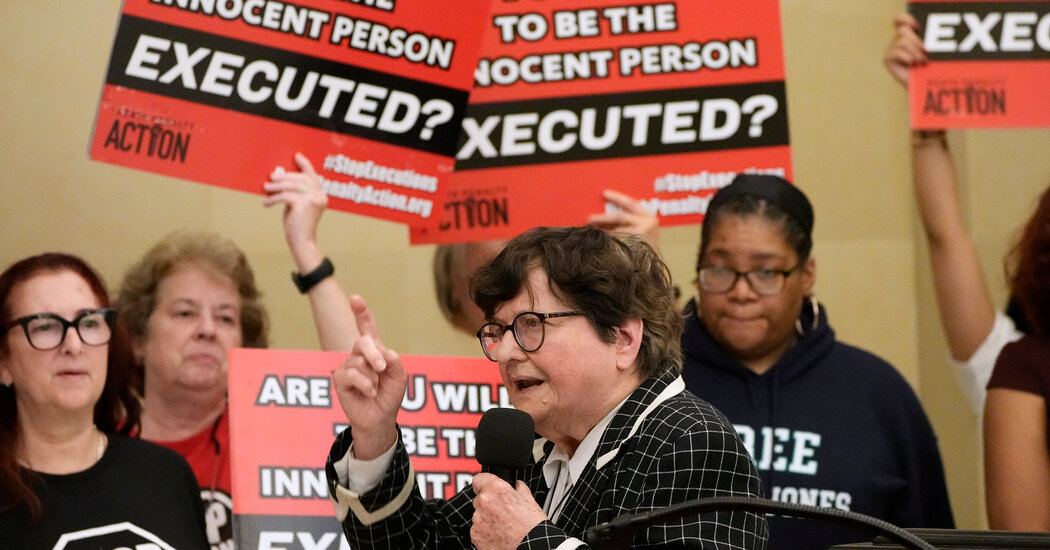WASHINGTON — The Supreme Court granted a stay of execution on Friday to Richard Glossip, a death row inmate in Oklahoma, after the state’s attorney ge
WASHINGTON — The Supreme Court granted a stay of execution on Friday to Richard Glossip, a death row inmate in Oklahoma, after the state’s attorney general, Gentner F. Drummond, a Republican, told the justices that he agreed that Mr. Glossip’s execution should be halted.
In a rare move, Mr. Drummond wrote that the state had “come to the difficult but essential conclusion that Glossip’s capital conviction is unsustainable and a new trial imperative.”
Lawyers call such statements “confessions of error,” and courts ordinarily give them great weight. The stay issued by the Supreme Court will remain in place while the justices decide whether to hear Mr. Glossip’s appeal, and if they do, until they decide it.
As is customary in rulings on stay applications, the court provided no reasoning. There were no public dissents. Justice Neil M. Gorsuch recused himself from the case but did not say why.
The court’s conservative majority is generally skeptical of requests for stays from death row inmates, seeming to view them as products of litigation gamesmanship meant to delay executions indefinitely. In January, however, the court gave Areli Escobar, a death row inmate in Texas, a new chance to challenge his conviction in light of a district attorney’s confession of error after the discovery of flawed DNA evidence.
Oklahoma’s Supreme Court filing was notable for a second reason. The lead lawyer representing the state was Paul D. Clement, who was solicitor general in the administration of George W. Bush and is a star of the Supreme Court bar, having argued more than 100 cases before the justices.
Don Knight, a lawyer for Mr. Glossip, thanked the court in a statement “for doing the right thing.” He added, “There is nothing more harrowing than the thought of executing a man who the state now admits has never received a fair trial.”
In his own statement, Mr. Drummond said he was “very grateful to the U.S. Supreme Court for their decision to grant a stay of execution,” adding that he would “continue working to ensure justice prevails in this important case.”
Mr. Glossip, 60, was convicted based on the testimony of, in the words of Oklahoma’s Supreme Court brief, “the state’s indispensable witness,” a handyman named Justin Sneed, who pleaded guilty to killing Barry Van Treese, the owner of a motel in Oklahoma City, beating him to death in 1997 with a baseball bat.
Mr. Sneed, who received a life sentence, testified that Mr. Glossip, the motel’s manager, had instructed him to kill Mr. Van Treese.
Recently disclosed documents contradicted Mr. Sneed’s testimony about whether he had been treated by a psychiatrist, and they appeared to show that he had been diagnosed with bipolar affective disorder.
“When I was arrested,” Mr. Sneed testified, “I asked for some Sudafed because I had a cold, but then shortly after that somehow they ended up giving me lithium for some reason. I don’t know why. I never seen no psychiatrist or anything.”
In fact, the state’s brief said: “Sneed had been treated by a psychiatrist in 1997. Further, he was not prescribed lithium for a cold. Instead, he was prescribed it to treat his serious psychiatric condition that combined with his known methamphetamine use would have had an impact on his credibility and memory recall in addition to causing him to become potentially violent or suffer from paranoia.”
Prosecutors had reason to know that Mr. Sneed’s testimony was false, the state’s brief said. “Despite this knowledge,” it said, “the state permitted Sneed to effectively hide his psychiatric condition and the reason for his prior lithium prescription through materially false testimony to the jury.”
Mr. Drummond had made similar arguments to the Oklahoma Court of Criminal Appeals, the state’s highest court for criminal matters, but that court unanimously rejected his confession of error. The Oklahoma Pardon and Parole Board deadlocked by a 2-to-2 vote on Mr. Glossip’s request for a recommendation of clemency. His execution had been scheduled for May 18.
Mr. Glossip has attracted support from celebrities like Kim Kardashian and state lawmakers from both political parties. Two independent investigations have cast doubt on his guilt.
www.nytimes.com
